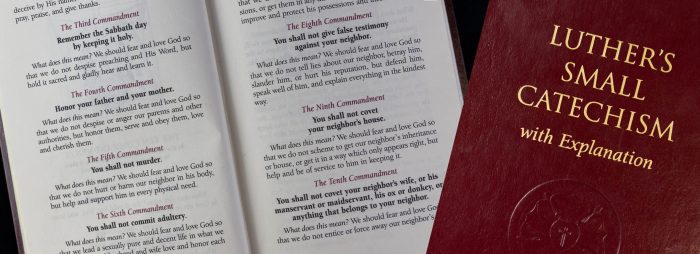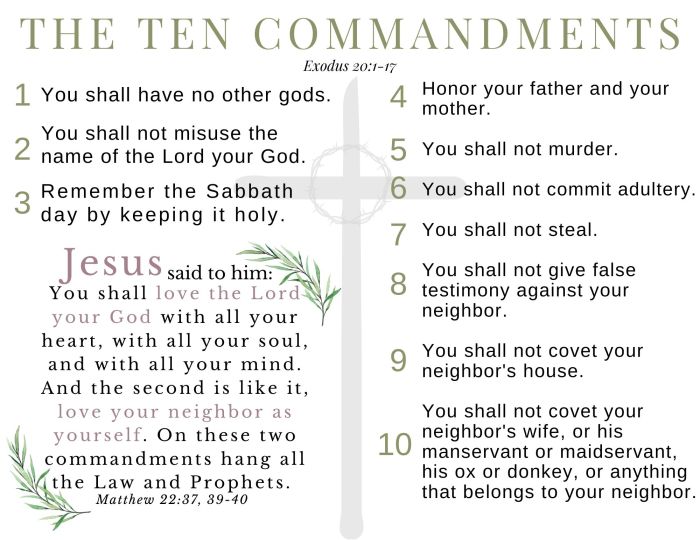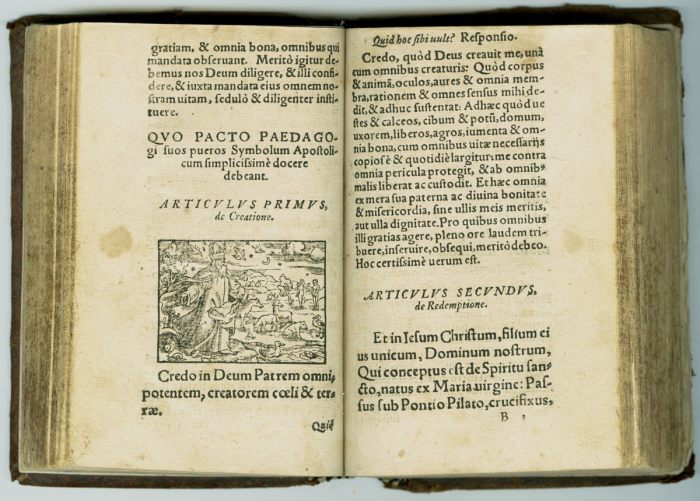Luther’s small catechism 10 commandments – Luther’s Small Catechism: Exploring the Ten Commandments is a captivating resource that delves into the fundamental principles of Christian faith and conduct. This seminal work, authored by Martin Luther in the 16th century, offers a comprehensive guide to understanding and applying God’s moral law to our daily lives.
Through a series of thought-provoking questions and answers, Luther’s Small Catechism unpacks the meaning and significance of each commandment, providing insights into their historical, theological, and practical implications. It encourages readers to reflect on their own actions and strive for a life that aligns with God’s will.
Introduction

Luther’s Small Catechism is a concise and influential document that summarizes the basic teachings of the Lutheran faith. Written by Martin Luther in 1529, the Catechism is intended to provide a basic framework for Christian instruction and discipleship. One of the central components of the Catechism is its exposition of the Ten Commandments, which play a pivotal role in Lutheran theology and practice.
The First Commandment
The First Commandment states, “You shall have no other gods before me.” This commandment prohibits the worship of any other deity besides the one true God. Idolatry, the worship of false gods or created objects, is a grave sin that violates this commandment.
The consequences of idolatry include spiritual blindness, moral decay, and divine judgment.
The Second Commandment
The Second Commandment prohibits the making and worshipping of idols. This commandment reinforces the First Commandment by emphasizing the exclusive nature of God’s worship. God alone is worthy of our adoration and devotion. Superstition, the belief in the power of non-divine beings or objects, is a form of idolatry that violates this commandment.
The Third Commandment
The Third Commandment emphasizes the importance of using God’s name reverently. Blasphemy, the act of speaking disrespectfully about God, is a grave sin that violates this commandment. Profanity, the use of vulgar or obscene language, is also a form of blasphemy that dishonors God’s name.
The Fourth Commandment
The Fourth Commandment calls for the observance of the Sabbath, a day set aside for rest and worship. The Sabbath provides an opportunity for Christians to cease from their daily labors and focus on their relationship with God. Rest and worship are essential for spiritual and physical well-being.
The Fifth Commandment
The Fifth Commandment emphasizes the importance of honoring parents and authority figures. This commandment establishes the authority of parents and other leaders in society. Children are responsible for obeying and respecting their parents, while parents have the duty to nurture and provide for their children.
The Sixth Commandment
The Sixth Commandment prohibits murder, the unlawful killing of another human being. This commandment affirms the sanctity of human life and the importance of protecting it. Violence, aggression, and hatred are all violations of this commandment.
The Seventh Commandment, Luther’s small catechism 10 commandments
The Seventh Commandment prohibits adultery, the act of sexual intercourse between a married person and someone other than their spouse. This commandment emphasizes the importance of marriage and fidelity. Sexual immorality, including adultery, fornication, and prostitution, are violations of this commandment.
The Eighth Commandment
The Eighth Commandment prohibits stealing, the unlawful taking of another person’s property. This commandment emphasizes the importance of honesty and integrity. Dishonesty, theft, and fraud are all violations of this commandment.
The Ninth Commandment
The Ninth Commandment prohibits false witness, the act of giving false or misleading testimony. This commandment emphasizes the importance of truthfulness and the consequences of lying. Perjury, slander, and gossip are all violations of this commandment.
The Tenth Commandment
The Tenth Commandment prohibits coveting, the desire for something that belongs to someone else. This commandment addresses the root of sin, which is the desire for more than what we have. Envy, greed, and discontentment are all violations of this commandment.
Helpful Answers: Luther’s Small Catechism 10 Commandments
What is the purpose of Luther’s Small Catechism?
Luther’s Small Catechism was created to provide a concise and accessible guide to the Ten Commandments, helping Christians understand and apply God’s moral law to their daily lives.
What are the key themes explored in Luther’s Small Catechism?
Luther’s Small Catechism covers a wide range of themes, including the nature of sin, the importance of repentance, the role of faith in salvation, and the responsibilities of Christians in society.
How can Luther’s Small Catechism be used in Christian education?
Luther’s Small Catechism is a valuable resource for Christian education, providing a framework for teaching children and adults about the Ten Commandments and their significance in the Christian faith.

